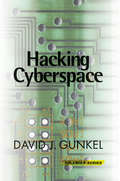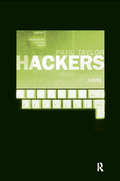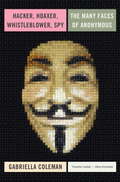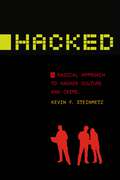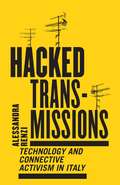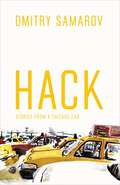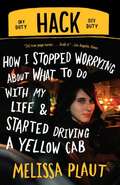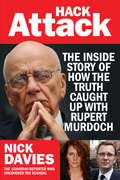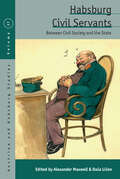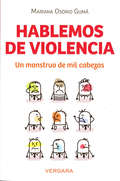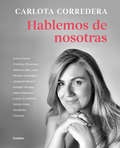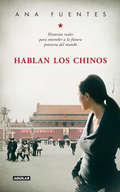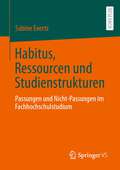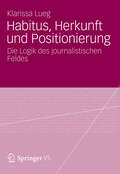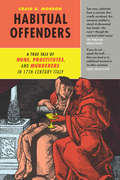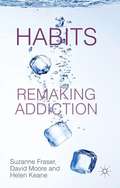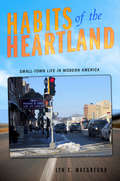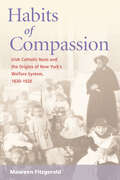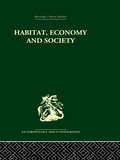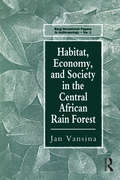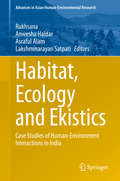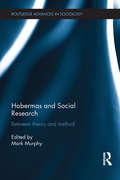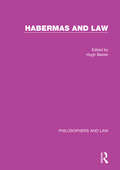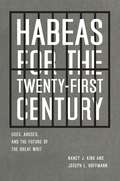- Table View
- List View
Hacking Cyberspace
by David J. GunkelIn Hacking Cyberspace David J. Gunkel examines the metaphors applied to new technologies, and how those metaphors inform, shape, and drive the implementation of the technology in question. The author explores the metaphorical tropes that have been employed to describe and evaluate recent advances in computer technology, telecommunications systems, and interactive media. Taking the stance that no speech is value-neutral, Gunkel examines such metaphors as "the information superhighway" and "the electronic frontier" for their political and social content, and he develops a critical investigation that not only traces the metaphors' conceptual history, but explicates their implications and consequences for technological development. Through Hacking Cyberspace, David J. Gunkel develops a sophisticated understanding of new technology that takes into account the effect of technoculture's own discursive techniques and maneuvers on the actual form of technological development.
Hackers: Crime and the Digital Sublime
by Paul TaylorThe practice of computer hacking is increasingly being viewed as a major security dilemma in Western societies, by governments and security experts alike.Using a wealth of material taken from interviews with a wide range of interested parties such as computer scientists, security experts and hackers themselves, Paul Taylor provides a uniquely revealing and richly sourced account of the debates that surround this controversial practice. By doing so, he reveals the dangers inherent in the extremes of conciliation and antagonism with which society reacts to hacking and argues that a new middle way must be found if we are to make the most of society's high-tech meddlers.
Hacker, Hoaxer, Whistleblower, Spy: The Many Faces of Anonymous
by Gabriella ColemanHere is the ultimate book on the worldwide movement of hackers, pranksters, and activists that operates under the non-name Anonymous, by the writer the Huffington Post says "knows all of Anonymous' deepest, darkest secrets."Half a dozen years ago, anthropologist Gabriella Coleman set out to study the rise of this global phenomenon just as some of its members were turning to political protest and dangerous disruption (before Anonymous shot to fame as a key player in the battles over WikiLeaks, the Arab Spring, and Occupy Wall Street). She ended up becoming so closely connected to Anonymous that the tricky story of her inside-outside status as Anon confidante, interpreter, and erstwhile mouthpiece forms one of the themes of this witty and entirely engrossing book.The narrative brims with details unearthed from within a notoriously mysterious subculture, whose semi-legendary tricksters--such as Topiary, tflow, Anachaos, and Sabu--emerge as complex, diverse, politically and culturally sophisticated people. Propelled by years of chats and encounters with a multitude of hackers, including imprisoned activist Jeremy Hammond and the double agent who helped put him away, Hector Monsegur, Hacker, Hoaxer, Whistleblower, Spy is filled with insights into the meaning of digital activism and little understood facets of culture in the Internet age, including the history of "trolling," the ethics and metaphysics of hacking, and the origins and manifold meanings of "the lulz."
Hacked: A Radical Approach to Hacker Culture and Crime (Alternative Criminology #2)
by Kevin F. SteinmetzInside the life of a hacker and cybercrime culture. Public discourse, from pop culture to political rhetoric, portrays hackers as deceptive, digital villains. But what do we actually know about them? In Hacked, Kevin F. Steinmetz explores what it means to be a hacker and the nuances of hacker culture. Through extensive interviews with hackers, observations of hacker communities, and analyses of hacker cultural products, Steinmetz demystifies the figure of the hacker and situates the practice of hacking within the larger political and economic structures of capitalism, crime, and control.This captivating book challenges many of the common narratives of hackers, suggesting that not all forms of hacking are criminal and, contrary to popular opinion, the broader hacker community actually plays a vital role in our information economy. Hacked thus explores how governments, corporations, and other institutions attempt to manage hacker culture through the creation of ideologies and laws that protect powerful economic interests. Not content to simply critique the situation, Steinmetz ends his work by providing actionable policy recommendations that aim to redirect the focus from the individual to corporations, governments, and broader social issues. A compelling study, Hacked helps us understand not just the figure of the hacker, but also digital crime and social control in our high-tech society.
Hacked Transmissions: Technology and Connective Activism in Italy
by Alessandra RenziMapping the transformation of media activism from the seventies to the present dayHacked Transmissions is a pioneering exploration of how social movements change across cycles of struggle and alongside technology. Weaving a rich fabric of local and international social movements and media practices, politicized hacking, and independent cultural production, it takes as its entry point a multiyear ethnography of Telestreet, a network of pirate television channels in Italy that combined emerging technologies with the medium of television to challenge the media monopoly of tycoon-turned-prime minister Silvio Berlusconi. Street televisions in Italy represented a unique experiment in combining old and new media to forge grassroots alliances, fight social isolation, and build more resilient communities. Alessandra Renzi digs for the roots of Telestreet in movements of the 1970s and the global activism of the 1990s to trace its transformations in the present work of one of the network&’s more active nodes, insu^tv, in Naples. In so doing, she offers a comprehensive account of transnational media activism, with particular attention to the relations among groups and projects, their modes of social reproduction, the contexts giving rise to them, and the technology they adopt—from zines and radios to social media. Hacked Transmissions is also a study in method, providing examples of co-research between activist researchers and social movements, and a theoretical framework that captures the complexities of grassroots politics and the agency of technology. Providing a rare and timely glimpse into a key activist/media project of the twenty-first century, Hacked Transmissions marks a vital contribution to debates in a range of fields, including media and communication studies, anthropology, science and technology studies, social movements studies, sociology, and cultural theory.
Hack: Stories from a Chicago Cab
by Dmitry SamarovCabdrivers and their yellow taxis are as much a part of the cityscape as the high-rise buildings and the subway. We hail them without thought after a wearying day at the office or an exuberant night on the town. And, undoubtedly, taxi drivers have stories to tell—of farcical local politics, of colorful passengers, of changing neighborhoods and clandestine shortcuts. No one knows a city’s streets—and thus its heart—better than its cabdrivers. And from behind the wheel of his taxi, Dmitry Samarov has seen more of Chicago than most Chicagoans will hope to experience in a lifetime. An artist and painter trained at the School of the Art Institute of Chicago, Samarov began driving a cab in 1993 to make ends meet, and he’s been working as a taxi driver ever since. In Hack: Stories from a Chicago Cab, he recounts tales that will delight, surprise, and sometimes shock the most seasoned urbanite. We follow Samarov through the rhythms of a typical week, as he waits hours at the garage to pick up a shift, ferries comically drunken passengers between bars, delivers prostitutes to their johns, and inadvertently observes drug deals. There are long waits with other cabbies at O’Hare, vivid portraits of street corners and their regular denizens, amorous Cubs fans celebrating after a game at Wrigley Field, and customers who are pleasantly surprised that Samarov is white—and tell him so. Throughout, Samarov’s own drawings—of his fares, of the taxi garage, and of a variety of Chicago street scenes—accompany his stories. In the grand tradition of Nelson Algren, Saul Bellow, Mike Royko, and Studs Terkel, Dmitry Samarov has rendered an entertaining, poignant, and unforgettable vision of Chicago and its people.
Hack: How I Stopped Worrying About What to Do with My Life and Started Driving a Yellow Cab
by Melissa PlautIn her late 20s, Plaut decided to honor a long-held secret ambition by becoming a New York City taxi driver. With wit and insight, she recreates the crazy parade of humanity that passes through her cab and shows how this grueling work provides her with a greater sense of self.
Hack Attack: The Inside Story of How the Truth Caught Up with Rupert Murdoch
by Nick DaviesSince 2006, award-winning investigative journalist Nick Davies has worked tirelessly — determined, driven, brilliant — to uncover the truth about the goings on behind the scenes at the News of the World and News International. This book brings us the definitive, inside story of the whole scandal.In Hack Attack: The Inside Story of How the Truth Caught Up with Rupert Murdoch, Nick Davies reveals how he worked with a network of lawyers, politicians, and celebrities to expose the facts and to stand up to Rupert Murdoch, arguably one of the most powerful men in the world; how News International attempted to protect itself with lies and threats and money; how the police and the press regulators failed; how the prime minister ended up with the wrong man inside his office. This book discloses in detail for the first time the full extent of crimes committed by the corporation and other Fleet Street papers, and probes the relationship between Murdoch and his network with government. It is also a thrilling, nail-biting account of an investigative journalist’s journey, showing us how the quest unfolded, and is a shining example of the might of good journalism. This is not simply a story about journalists behaving badly, this is a story about power and truth.Ambitious, comprehensive, gripping, essential — Hack Attack is the definitive book about the biggest scandal of our age. There will be no other book like it.
Habsburg Civil Servants: Between Civil Society and the State (Austrian and Habsburg Studies)
by Alexander Maxwell and Daša LičenThe Habsburg Empire’s development into a modern nation state was, necessarily, bound up with the emergence of a vast bureaucratic network of civil servants. Responsible for addressing diverse social problems in areas such as education, public transportation, and health services, these officials enabled the Habsburg monarchy to maintain rule over geographically disparate domains. While Habsburg civil servants were often maligned as instruments of an oppressive regime, this volume provides a new perspective on their lives during the nineteenth century, spotlighting how they simultaneously constituted and challenged the state. In doing so, Habsburg Civil Servants reconceptualizes our understanding of the boundary between the realms of the state and the public.
Hablemos de violencia: Un monstruo de mil cabezas
by Mariana Osorio GumáUn relato trepidante sobre uno de los problemas más inquietantes y preocupantes de nuestro país: la violencia. Además de ayudar a comprender el fenómeno, este texto permite ver cómo en cada ciudadano está una parte de la solución. # En este libro, dirigido a cualquier persona preocupada por los alarmantes índices de violencia en México, la novelista y psicoanalistaMariana Osorio explora las raíces profundas del problema para a continuación analizar situaciones comunes de violencia, en las familias y en las escuelas, que pueden afectar de manera especial a los niños. Con guiños a la literatura, el cine, la clínica y la cultura popular, ofrece a los lectores claves para analizar si la violencia está presente en sus vidas en alguna medida (ya sea como víctimas o victimarios),así como propuestas para escapar de este círculo vicioso y no abonar el terreno donde se cultiva la violencia criminal.
Hablemos de nosotras
by Carlota CorrederaNunca se había hablado tanto de feminismo. Nunca se había hablado tanto de igualdad. Nunca se había hablado tanto de nosotras. En un momento clave para las mujeres, la periodista y presentadora Carlota Corredera ha mantenido once apasionantes charlas con once personalidades que dan la cara: Alba Palacios, Alberto San Juan, Anabel Alonso, Anna Ferrer, Chenoa, Cristina Cifuentes, Joaquim Bosch, Laura G. Molero, Miriam González, Sonia Vivas y Verdeliss. En Hablemos de nosotras se reflexiona y conversa con mujeres pero también con hombres porque la igualdad, la conciliación, la corresponsabilidad en la crianza de los hijos, los techos de cristal y la violencia machista son problemas de todos. Este libro pretende, según su autora, «que las mujeres que lo lean se sientan más comprendidas y más ligeras ante los pesos emocionales que cargan cada día y que los hombres nos entiendan mejor y se unan en esta marcha imparable hacia la igualdad real.»
Hablan los chinos. Historias reales para entender a la futura potencia del mundo: Historias Reales Para Entender A La Futura Potencia Del Mundo
by Ana FuentesUna obra coral resultado de una magnífica labor periodística que desentraña los misterios de un país desconocido aún hoy para Occidente. Un disidente torturado por la policía, un joven millonario nacionalista, un emigrante que cruza el país en busca de trabajo, un viejo maestro de kung-fu que ha dejado de entrenar por la contaminación, una campesina que se prostituye para pagar la educación de su hijo... ¿Quiénes son los chinos? La periodista Ana Fuentes, que ha sido corresponsal de la Cadena SER en Pekín, recoge en Hablan los chinos el testimonio en primera persona de ciudadanos que han decidido romper su silencio y hablar de la realidad de su país -su relación con la familia, con el poder, con el resto del mundo-. Historias reales de individuos de distinto nivel cultural y poder adquisitivo que impactan por lo insólito, que emocionan y que ponen fin a muchos clichés. Una obra coral resultado de una magnífica labor periodística que desentraña los misterios de un país desconocido aún hoy para Occidente. China ha crecido vertiginosamente en los últimos años hasta convertirse en la segunda economía mundial. En 2008 fue sede de los Juegos Olímpicos, su puesta de largo ante la comunidad internacional entre censura, represión de los activistas y unos niveles de corrupción desorbitados. Una China tan nueva como milenaria que trata de superar los traumas del colonialismo extranjero, las hambrunas del Gran salto hacia delante y las atrocidades de la Revolución Cultural. «Ganarme su confianza no fue fácil: algunos nunca habían dirigido la palabra antes a un extranjero. Tras meses intensos de charlas, paseos y alguna persecución policial acabaron hablándome abiertamente de sus metas y de sus frustraciones. Éste es el resultado». Ana Fuentes
Habitus, Ressourcen und Studienstrukturen: Passungen und Nicht-Passungen im Fachhochschulstudium
by Sabine EvertzWie erleben Studierende ihr Studium und wie hängt dieses Erleben mit ihren Habitusmustern und Ressourcenausstattungen zusammen? Die soziologische Studie widmet sich aus ungleichheitstheoretischer Perspektive den Passungen und Nicht-Passungen im Fachhochschulstudium. Ergründet wurden Konstellationen von Habitusmustern, Ressourcenausstattungen und Studienstrukturen. Bei den Studienstrukturen handelt es sich unter anderem um studienorganisatorische Strukturen wie die Stundenplangestaltung, um unmittelbar auf die Lehre bezogene Strukturen wie Lehrmethoden und Prüfungsformen oder auch um Strukturen, die im Besonderen das soziale Miteinander betreffen wie die Studienatmosphäre. Die Ergebnisse basieren auf der Analyse von Leitfadeninterviews mit Studierenden der Studienfächer Soziale Arbeit und Maschinenbau sowie auf der Auswertung von Wochenbüchern, die Erstsemesterstudierende in der Studieneingangsphase verfasst haben.
Habitus, Herkunft und Positionierung
by Klarissa LuegKlarissa Lueg geht der Frage nach dem Zusammenhang zwischen sozialer Herkunft und der Hierarchie im journalistischen Feld nach. Dabei wird grundsätzlich die Herkunft von ChefredakteurInnen und JournalistenschülerInnen und die Bedeutung dieser sozialen Herkunft für Berufszugang und Positionierungsstrategien erläutert. Es wird deutlich, dass nicht nur die Karrierewege der untersuchten Gruppen selbst ein herkunftsspezifisches Muster aufweisen, sondern dass auch die Verteilung und Zuweisung von Macht im journalistischen Feld eng mit der Herkunft ihrer TrägerInnen verbunden ist.
Habitual Offenders: A True Tale of Nuns, Prostitutes, and Murderers in Seventeenth-Century Italy
by Craig A. MonsonIn April 1644, two nuns fled Bologna's convent for reformed prostitutes. A perfunctory archiepiscopal investigation went nowhere, and the nuns were quickly forgotten. By June of the next year, however, an overwhelming stench drew a woman to the wine cellar of her Bolognese townhouse, reopened after a two-year absence--where to her horror she discovered the eerily intact, garroted corpses of the two missing women. Drawing on over four thousand pages of primary sources, the intrepid Craig A. Monson reconstructs this fascinating history of crime and punishment in seventeenth-century Italy. Along the way, he explores Italy's back streets and back stairs, giving us access to voices we rarely encounter in conventional histories: prostitutes and maidservants, mercenaries and bandits, along with other "dubious" figures negotiating the boundaries of polite society. Painstakingly researched and breathlessly told, Habitual Offenders will delight historians and true-crime fans alike.
Habits: Remaking Addiction
by David Moore Suzanne Fraser Helen KeaneWhat is 'addiction'? What does it say about us, our social arrangements and our political preoccupations? Where is it going as an idea and what is at stake in its ongoing production? Drawing on ethnographic research, interviews and media and policy texts, this book traces the remaking of addiction in contemporary Western societies.
Habits of the Heartland: Small-Town Life in Modern America
by Lyn C. Macgregor"So, how do Americans in a small town make community today? This book argues that there is more than one answer, and that despite the continued importance of small-town stuff traditionally associated with face-to-face communities, it makes no sense to think that contemporary technological, economic, and cultural shifts have had no impact on the ways Americans practice community life. Instead, I found that different Viroquans took different approaches to making community that reflected different confluences of moral logics--their senses of obligation to themselves, to their families, to Viroqua, and to the world beyond it, and about the importance of exercising personal agency. The biggest surprise was that these ideas about obligation and agency, and specifically about the degree to which it was necessary or good to try to bring one's life into precise conformance with a set of larger goals, turned out to have replaced more traditional markers of social belonging like occupation and ethnicity, in separating Viroquans into social groups. "--from Habits of the Heartland Although most Americans no longer live in small towns, images of small-town life, and particularly of the mutual support and neighborliness to be found in such places, remain powerful in our culture. In Habits of the Heartland, Lyn C. Macgregor investigates how the residents of Viroqua, Wisconsin, population 4,355, create a small-town community together. Macgregor lived in Viroqua for nearly two years. During that time she gathered data in public places, attended meetings, volunteered for civic organizations, talked to residents in their workplaces and homes, and worked as a bartender at the local American Legion post. Viroqua has all the outward hallmarks of the idealized American town; the kind of place where local merchants still occupy the shops on Main Street and everyone knows everyone else. On closer examination, one finds that the town contains three largely separate social groups: Alternatives, Main Streeters, and Regulars. These categories are not based on race or ethnic origins. Rather, social distinctions in Viroqua are based ultimately on residents' ideas about what a community is and why it matters. These ideas both reflect and shape their choices as consumers, whether at the grocery store, as parents of school-age children, or in the voting booth. Living with--and listening to--the town's residents taught Macgregor that while traditional ideas about "community," especially as it was connected with living in a small town, still provided an important organizing logic for peoples' lives, there were a variety of ways to understand and create community.
Habits of Compassion: Irish Catholic Nuns and the Origins of New York's Welfare System, 1830-1920 (Women, Gender, and Sexuality in American History)
by Maureen FitzgeraldThe Irish-Catholic Sisters accomplished tremendously successful work in founding charitable organizations in New York City from the Irish famine through the early twentieth century. Maureen Fitzgerald argues that their championing of the rights of the poor—especially poor women—resulted in an explosion of state-supported services and programs. Parting from Protestant belief in meager and means-tested aid, Irish Catholic nuns argued for an approach based on compassion for the poor. Fitzgerald positions the nuns' activism as resistance to Protestantism's cultural hegemony. As she shows, Roman Catholic nuns offered strong and unequivocal moral leadership in condemning those who punished the poor for their poverty and unmarried women for sexual transgression. Fitzgerald also delves into the nuns' own communities, from the class-based hierarchies within the convents to the political power they wielded within the city. That power, amplified by an alliance with the local Irish Catholic political machine, allowed the women to expand public charities in the city on an unprecedented scale.
Habitation of Mordinity
by Dipesh ChakrabartyIn Habitations of Modernity, Dipesh Chakrabarty explores the complexities of modernism in India and seeks principles of humaneness grounded in everyday life that may elude grand political theories. The questions that motivate Chakrabarty are shared by all postcolonial historians and anthropologists: How do we think about the legacy of the European Enlightenment in lands far from Europe in geography or history? How can we envision ways of being modern that speak to what is shared around the world, as well as to cultural diversity? How do we resist the tendency to justify the violence accompanying triumphalist moments of modernity? Chakrabarty pursues these issues in a series of closely linked essays, ranging from a history of the influential Indian series Subaltern Studies to examinations of specific cultural practices in modern India, such as the use of khadi—Gandhian style of dress—by male politicians and the politics of civic consciousness in public spaces. He concludes with considerations of the ethical dilemmas that arise when one writes on behalf of social justice projects.
Habitat, Economy and Society: A Geographical Introduction to Ethnology
by C. Daryll FordeAn introduction to the ethnography and human geography of non-European peoples, this book deals with the economic and social life of a number of groups at diverse levels of cultural achievement and in different regions of the world. International in its scope the book covers: Malaysia, Africa, North America, Canada, Siberia, the Amazon, Eastern Solomon Islands, India, Central Asia and the Middle East. Originally published in 1934. This re-issues the seventh edition of 1949.
Habitat, Economy and Society in the Central Africa Rain Forest
by Jan VansinaOver 50 years ago, the renowned anthropologist Daryll Forde strongly advocated comparative anthropological studies. Professor Vansina argues that 50 years later, Forde's criticisms still apply despite both Forde's considerable intellectual legacy and an exponential increase in available information. Using the example of Central African peoples, Professor Vansina challenges the current scholarship of sociologists and anthropologists, and makes a compelling case for broad, historical, comparative studies.
Habitat, Ecology and Ekistics: Case Studies of Human-Environment Interactions in India (Advances in Asian Human-Environmental Research)
by Rukhsana Anwesha Haldar Asraful Alam Lakshminarayan SatpatiThis volume uses an innovative and interdisciplinary approach to assess various issues resulting from human-environment interactions in relation to sustainable development. The book encompasses theoretical and applied aspects, using both thematic and regional case studies from India, to highlight the impact of human-environment interactions at various spatio-temporal scales, with each study focusing on a particular anthropogenic issue, particularly in an Indian context. The book's three focal themes (e.g. habitat linkages, ekistics and social ecology, hazard and environmental management) elaborate the essential components of human-environment interactions with nature, its impact on the surrounding natural and social environments, and management techniques through research innovations. Readers will learn how maladjustments, disturbances and disasters are often inevitable byproducts of human-environment systems, and what conceptual and practical strategies can be applied towards sustainable coexistence. The book will be of interest to students, academics and policymakers engaged in environmental management, human-environment interactions and sustainable development.
Habermas and Social Research: Between Theory and Method (Routledge Advances in Sociology)
by Mark MurphyOne of the greatest contributors to the field of Sociology, Jürgen Habermas has had a wide-ranging and significant impact on understandings of social change and social conflict. He has inspired researchers in a range of disciplines with his multidimensional social theory, however an overview of his theory in applied settings is long overdue. This collection brings together in one convenient volume a set of researchers who place Jürgen Habermas’ key concepts such as colonisation, deliberation and communication at the centre of their research methodologies. Full of insight and innovation, this book is an essential read for those who want to harness the potential of Habermas’ core concepts in their own work, thereby helping to bridge the gap between theory and method in social research. Structured around three core themes, Habermas and Social Research provides a range of research case studies looking at system colonization, the politics of deliberation and communicative interactions. Issues as diverse as social movements, the digital public sphere, patient involvement, migration and preschool education, are all covered in the book, intertwined with a set of innovative approaches to theory application in social research. Designed to help researchers harness the potential of Habermas’ core concepts as methodological tools, this timely volume will prove highly useful for graduate and upper level undergraduates within the fields of theory and method, research design, public policy, education policy, urban and environmental planning.
Habermas and Law
by Hugh BaxterHabermas and Law makes accessible the most important essays in English that deal with the application to law of the work of major philosophers for whom law was not a main concern. It encompasses not only what these philosophers had to say about law but also brings together essays which consider those aspects of the work of major philosophers which bear on our interpretation and assessment of current law and legal theory. The essays are based on scholarly study of particular philosophers and deal with both the nature and role of law and the application of philosophy to specific areas of law.
Habeas for the Twenty-First Century: Uses, Abuses, and the Future of the Great Writ
by Nancy J. King Joseph L. HoffmannFor centuries, the writ of habeas corpus has served as an important safeguard against miscarriages of justice, and today it remains at the center of some of the most contentious issues of our time—among them terrorism, immigration, crime, and the death penalty. Yet, in recent decades, habeas has been seriously abused. In this book, Nancy J. King and Joseph L. Hoffmann argue that habeas should be exercised with greater prudence. Through historical, empirical, and legal analysis, as well as illustrative case studies, the authors examine the current use of the writ in the United States and offer sound reform proposals to help ensure its ongoing vitality in today’s justice system. Comprehensive and thoroughly grounded in a modern understanding of habeas corpus, this informative book will be an insightful read for legal scholars and anyone interested in the importance of habeas corpus for American government.
